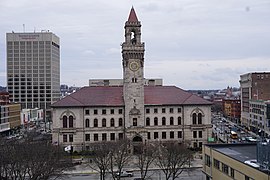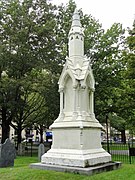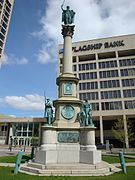Worcester City Hall and Common
Worcester City Hall and Common | ||
MPS Worcester MRA | | |
| NRHP reference No. | 78001405 [1] | |
|---|---|---|
| Added to NRHP | March 29, 1978 | |
The Worcester City Hall and Common, the civic heart of the city, are a historic
Early history
The Common, established in 1669, originally encompassed about 20 acres (8.1 ha), compared to its present size of 4.4 acres (1.8 ha).[2] A meeting house used for both town meetings and religious functions was constructed on the Common in 1719, on the same site as the current City Hall. In 1763, the first meeting house was demolished and what became known as The Old South Meeting House was constructed on the site. It was here, on July 14, 1776, that Isaiah Thomas publicly read the Declaration of Independence for the first time in New England.
Salem Square

Salem Square was a triangular-shaped plaza on the east side of Worcester Common.[3] Facing the square were two churches, the First Baptist Church (c. 1830s), and the Congregational Church (c. 1848).
Most of Salem Square was eliminated in the early 1970s as part of the Worcester Center urban renewal project, which replaced the plaza with an office building, shopping mall, and parking garage.[4]
Notre Dame des Canadiens
The Notre Dame des Canadiens was a landmark church which faced Salem Square and Worcester Common from 1929 to 2018.[5] In the 1920s, the Catholic Church purchased the Baptist Church on Salem Square and razed it in 1927 to build a new church to serve the city's French Catholic population, the cathedral-like Notre Dame des Canadiens.[5] The neo-Romanesque church measured 198 feet long, 91 feet wide, and 64 feet high, and ran from Trumbull Street to Salem Square.[5] The building featured two towers with gold crosses and a 194-foot high bell tower.[5]
The Roman Catholic diocese closed the church in 2008, due to falling attendance.[5] The building was sold in 2010 and demolished in October 2018.[5]
City Hall
Worcester City Hall was designed by
Burial ground, Civil War Memorial, and fountain
Near the center of the Common is the meeting house's burial ground, marked by gravestones and the Bigelow Monument. The Soldiers' Monument, located near the northeast corner of the Common, honors the 398 Worcester soldiers killed in the American Civil War. The Burnside Fountain, located near the southeast corner of the Common, provided water for horses, and features the sculpture Boy with a Turtle, commonly known as "Turtle Boy."
Photo Gallery
-
City Hall, front view
-
Old South Meeting House (circa 1885), demolished 1890s
See also
- National Register of Historic Places listings in northwestern Worcester, Massachusetts
- National Register of Historic Places listings in Worcester County, Massachusetts
Further reading
- Franklin P. Rice, ed. (1899). The New City Hall in Worcester, Massachusetts: A Testimonial to the City Hall Commission from the City Council. Worcester, Mass: F. S. Blanchard and Company.
References
- ^ a b "National Register Information System". National Register of Historic Places. National Park Service. April 15, 2008.
- ^ City of Worcester, Parks Dept.
- ^ "Salem Square, Worcester, Mass". Lost New England. 16 October 2016. Retrieved 16 August 2020.
- ^ Strahan, Derek (13 October 2016). "Soldiers' Monument, Worcester, Mass". Lost New England. Retrieved 16 August 2020.
- ^ a b c d e f Clew, William T (12 October 2018). "Farewell Dear Notre Dame". Catholic Free Press. Archived from the original on 3 November 2018. Retrieved 16 August 2020.
- ^ Worcester's City Hall Worcester and its People, College of the Holy Cross







